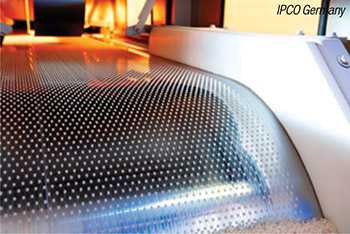 This company has continued to evolve its Rotoform granulation system (photo) through 11 different models, each designed to meet the requirements of a specific group of chemical melts. Chemical melt is delivered to the Rotoform unit and deposited onto a continuously running steel belt in drop form. Heat is transferred via the steel belt to cooling water sprayed against the underside of the belt, resulting in controlled solidification and the production of free flowing, uniform pastilles, an ideal form for subsequent storage, transportation, dosing and mixing. At the heart of the range is the Rotoform 4G, which is used for solidification of low- and high-viscosity melts. Other members of the 4G family have been developed for handling abrasive and sedimenting materials (such as catalysts and suspensions), melts requiring high feed temperatures (such as bitumen or resins) and the pastillation of subcooling melts (photochemicals). Easy cleaning and stainless-steel construction also hygienic operation. The Rotoform process is clean, dust-free and energy efficient, and its indirect cooling method eliminates any risk of cross-contamination between the product and cooling media, so there is no wastewater. Other recent updates include the availability of optional remote diagnostics, a system that allows users to grant temporary access to live data so that technicians can diagnose and resolve issues quickly. Hall 4.0 Booth D4 — IPCO Germany GmbH, Fellbach, Germany
This company has continued to evolve its Rotoform granulation system (photo) through 11 different models, each designed to meet the requirements of a specific group of chemical melts. Chemical melt is delivered to the Rotoform unit and deposited onto a continuously running steel belt in drop form. Heat is transferred via the steel belt to cooling water sprayed against the underside of the belt, resulting in controlled solidification and the production of free flowing, uniform pastilles, an ideal form for subsequent storage, transportation, dosing and mixing. At the heart of the range is the Rotoform 4G, which is used for solidification of low- and high-viscosity melts. Other members of the 4G family have been developed for handling abrasive and sedimenting materials (such as catalysts and suspensions), melts requiring high feed temperatures (such as bitumen or resins) and the pastillation of subcooling melts (photochemicals). Easy cleaning and stainless-steel construction also hygienic operation. The Rotoform process is clean, dust-free and energy efficient, and its indirect cooling method eliminates any risk of cross-contamination between the product and cooling media, so there is no wastewater. Other recent updates include the availability of optional remote diagnostics, a system that allows users to grant temporary access to live data so that technicians can diagnose and resolve issues quickly. Hall 4.0 Booth D4 — IPCO Germany GmbH, Fellbach, Germany
Achema 2022 Show Preview
| By Mary Page Bailey